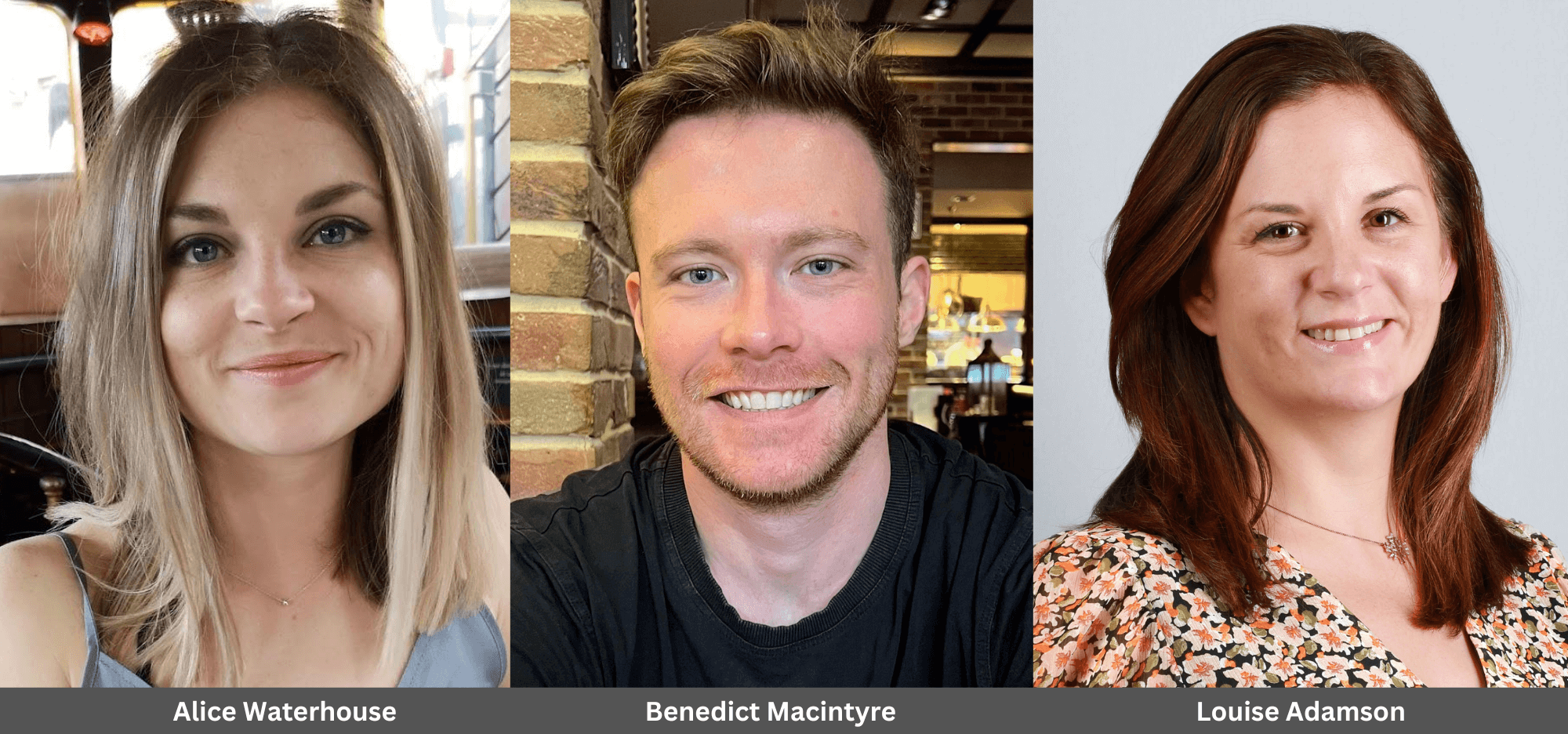Do you want to get into a career in MedComms and medical writing? If so, read on. We asked several members of our Scientific Services team to share their career stories. They cover how they found out about MedComms, their advice to help get into our exciting industry and what attracted them to Bedrock. And much more…
Imagine being in a role where the words you write will help patients live better lives; where you can turn science into actionable data so that healthcare professionals can make more informed decisions. That’s what medical communications, or MedComms, is all about. It’s a hugely rewarding career option in a highly dynamic sector.
Bedrock is a multi award-winning healthcare communications agency. We partner with healthcare professionals, patients, pharmaceutical and biotech clients across the globe to design and deliver compelling medical education programmes. Our Scientific Services team is right at the heart of our work, helping clients to refine their strategy, define scientific content and build their comms programmes. It’s a growing team too, with 2022 seeing lots of new starters joining at an exciting time for Bedrock.
We spoke to Louise Adamson – Head of Scientific Services, Alice Waterhouse – Associate Scientific Director and Benedict Macintyre – Medical Writer.
What got you interested in MedComms?
Many come into MedComms after a science-based degree or PhD. For anyone wanting to swap their lab coats and start communicating about science, a career in MedComms is an attractive option. As the team explain, MedComms can seem like a bit of a niche sector – but it’s a revelation when they find it.
Like many who discover MedComms, Benedict didn’t know the industry existed but soon saw the potential it offered. “I didn’t know MedComms was a thing, which is something I hear a lot, but my sister went into MedComms soon after her Masters. The more she explained what she did, the more I realised it could be really rewarding. I started explaining the science to family members who weren’t scientists and when they got it, I could see the value in what MedComms can do. So, I tried it and I’ve enjoyed every minute.”
As Louise explains, a career in MedComms offers the chance to keep learning about science and sharing that with others. “I did quite a lot of science communication outreach during my PhD, I enjoyed writing my thesis and I genuinely love learning about science and medicine, so medical writing sounded like a really interesting career option.”
Although Alice did a degree in Genetics, she’s always loved creative writing and really enjoyed the science communication thesis of her degree. As she explains, she discovered MedComms when she was graduating, almost by chance. “I saw an ad on our careers site for a medical writer and I thought ‘Ooh, a writer, that sounds like me. But even after a lot of Googling I still couldn’t find out much about medical writing. It was only when I went for an interview that I realised there was this entire industry sat under my nose this whole time and it was all about communicating science too.”
Tell us more about the roles you do at Bedrock?
Benedict is a Medical Writer with 14 months’ experience in MedComms. He joined Bedrock in September 2022 and is enjoying the variety in his role. “My work involves communicating scientific and clinical research to various target audiences and that can be anywhere between healthcare professionals to patients. I work on a huge number of different materials, so it can be presentations from healthcare professionals to various audiences, also manuscripts, abstracts and posters for conferences and things like that. It’s very varied work, but it’s all incredibly enjoyable.”
Alice has worked at several MedComms agencies before finding Bedrock at the same time as Benedict. Working closely with Louise, Alice explains her role. “I get to be involved in everything in the team which is one of the nice things about a smaller agency. One of the most important aspects is ensuring that the output of the Scientific Services team is the best it can be. All our work, not just at Bedrock, but in any agency where you have medical writers, goes through a thorough review for scientific accuracy and to make sure the writing is as good as it can be. To make sure that we’re meeting the client brief and doing the best job for the client that we can do. I’m also involved with managing and resourcing for the team and new business opportunities.”
As Head of Scientific Services, Louise is part of the senior leadership team at Bedrock. A key part of the role is around driving scientific and strategic excellence and providing strategic council to clients, as she explains. “We apply our freethinking approach to add value and exceed expectations. As a team we work to ensure the work we deliver is of the highest quality, accurate and compelling in nature. I’ve also grown and developed the team since I joined in the summer of 2022, evolving our team skill sets with scientific and strategic excellence at the heart of that.”
What attracted you to join Bedrock?
Benedict sees the Bedrock values as a major influence in deciding to join – along with the passion and warmth of the Bedrock team. He was in the process of applying to another agency when the opportunity with Bedrock came up. He picks up the story of what swayed him. “The recruiter said that Bedrock placed a lot of emphasis on their values. At first, I thought that a lot of places would say that. But it’s clear that that is the case at Bedrock. You come here and meet a team that lives and breathes their values and culture, and it just means that everyone really enjoys what they do and can do the best work of their lives. I always want to do the best that I can wherever I go, but it just makes it so much easier when you’re working for a company that really inspires you. That came across from the first instance of talking to Louise and meeting the team. From then on it was “I’m coming to Bedrock” and I can’t tell you how much I’m enjoying it.
It’s a similar story with Alice. “I had a chat with quite a few different people from the team, and the more I heard about the type of work that they did, the kind of clients that they had, the more it sounded like me. And, the values of the team and the kind of vibe I was getting from the team, I just thought, this is somewhere I could see myself being really happy and aligned with the kind of thing that I would like to do.” And Louise adds, “Bedrock people are very passionate about what they do and that comes from the top down through everyone in the team. People really do live the company values and that’s something that really attracted me to Bedrock. The company is also very ambitious with a good bunch of people all pulling in the right direction. I like our message to ‘come here to do the best work of your lives’. That’s a good mantra to have and to talk to our clients about too.”
What do you find exciting about MedComms right now?
Louise finds the career path opportunities for medical writers one of the most exciting developments in MedComms, as she explains. “Being part of a MedComms team allows scientific specialists to gain experience not only of the creation of compelling scientific content, but also the chance be part of a wider agency team, to build strong client relationships, to learn about how a business operates and to support training and development of junior writers. It’s a great industry to join for anyone with a growth mindset and, for me it’s been the constant challenges of developing existing skills and learning new skills. It’s also the variety that keeps a career in MedComms so interesting. It’s very hard to get bored in this industry. “
For Benedict, it’s the way that MedComms has the variety of content to match his own varied academic and scientific interests that excites him. “It’s about how diverse the job is, in the sense that you get to work on many different therapy areas. I’ve always really enjoyed keeping up to date with multiple areas. I did biochemistry and then genetics and I worked for a diabetes lab and then my PhD was in cancer metabolism, so I do have a very broad interest and so I wanted my work to be like that as well, so it could stimulate my interest in multiple ways. And so that’s the most interesting thing about MedComms because all of it, not only is it varied, but it’s also all cutting edge. It’s at the forefront of scientific knowledge so it’s incredibly stimulating and interesting. I think that’s my favourite thing about it.”
Having worked in MedComms for 10 years now, Alice is now seeing data being made much more accessible to those with a non-scientific background, and it’s something she feels is long overdue. “There’s a lot more open access articles and plainer language summaries that people can understand without a PhD – and clients are asking for it too. We produce infographics or visual abstracts, things that summarise this very complex information in a simple visual way, which again makes it accessible to more people and gives them more value. Doctors can give out a simple leaflet that really helps patients with everything they need to know. It’s good to see.”
What do you find rewarding about medical writing?
In a sector all about communicating complex science and healthcare data, medical writing is a vital role. And, as Louise explains, it’s a role that covers far more than the writing itself.
“As a medical writer, you need to be able to work and communicate well with your wider agency team. You need to be able to collaborate with clients, take on feedback and manage difficult conversations. You need to go beyond the brief to make sure you develop creative and compelling solutions. You need to be able to switch quickly from one project/therapy area to the next and manage your time effectively.”
Alice sees one key aspect of medical writing as explaining what healthcare professionals need to know to make better informed decisions for the patients. “They need information in a format that they can easily understand because that’s what helps them to be most effective. Their focus is on treating the patients – so our focus is giving them the information that they need to do that. It’s also about helping our clients who are mainly pharmaceutical companies. They have drugs, treatments, sometimes medical devices that they want to get out into doctor’s hands. Medical writing helps the doctors have the right information to best help their patients.”
What’s your favourite Bedrock project, so far?
Both Alice and Benedict are quite new to Bedrock, but they’ve already worked on projects they are proud of. Benedict covers one that particularly stands out. “I worked on a masterclass, which is a stand-alone event for HCPs. The masterclass involved working on nine speaker presentations from some of the top clinicians and researchers in the world. They’re talking about different aspects of their therapy areas and their own research and they’re presenting to healthcare professionals across Europe. It involved a lot of reading on what they’re researching and understanding why it’s so important and, how that’s eventually going to translate into better patient care.” As Benedict discovered, this also gave him an insight into how the team at Bedrock works. “I required a fair amount of support and almost instantly, people were offering help and strategising to see how we could all get it done together. Everyone is so skilled, passionate and supportive that someone else can pick something up for you, bring it back and it will just be perfect. It was just a nice demonstration of how well the teams work at Bedrock and being part of that team was a privilege.”
For Alice it’s been the opportunity to work in consensus programmes, an area new to her but a staple of what Bedrock do. So, what does she like about them? “We’re getting the experts together in one room, the people who treat patients and capturing all their thoughts. And at the end, they produce something collaboratively that they’re going to use and that they’re going to give to their peers to guide treatment decisions. I’ve found it very interesting to work on something that’s going to be so immediately applicable and actually help patients. You’re working directly with the experts and the pharmaceutical companies are just observers. So, it’s really different from anything I’ve worked on before.”
How do you see Bedrock supporting your career development?
Although only with Bedrock a short while, Alice already sees the way Bedrock gives support and autonomy as a contributor to future development. “I’ve seen opportunities in the way we are managed and the level of support is there for whatever you need. They’re absolutely happy for you to take ownership of your own work and lead it in as much a capacity as you want to. You’re not micromanaged – which I think you would only find in an agency keen to see people progress.”
Career development was one of the main reasons Benedict joined Bedrock, and he’s already seen plenty of opportunity. “When I was talking to Bedrock they made it very clear that career development for every member is incredibly important to the senior management. And it’s not only because they want you to feel supported and valued, but they know that if your career in MedComms develops, then that’s going to translate into you doing the best work that you can and ultimately really set our work apart. I’ve seen that every day so far, it’s a very nurturing and supportive climate. It’s really fantastic and I can see myself being at Bedrock for a very, very long time.
What advice would you give anyone wanting to get into MedComms?
For anyone coming into this industry on the scientific side, it’s always helpful to have a scientific background and a good understanding of what the pharmaceutical industry is and how it operates. But, as Louise explains, it’s also all about demonstrating communication ability too. “When I look for people to join my team, I don’t base it on just scientific background and qualifications or even what therapy areas they might have experience of. A scientific background is a great basis, but there’s definitely more to a career in MedComms than that, particularly as you progress in the industry so be sure to showcase as much of the above as possible throughout the various stages of the interview process. I’d also say be bold and be proactive, reach out directly to companies.”
Benedict suggests a similar approach and suggests contacting people who are already medical writers. “A really good starting point, if possible, would be to find a medical writer to talk to, ask questions. I’ve already had calls from some of my colleagues from my PhD wanting to find out about our industry. If you have a passion and an interest for biological and clinical research and communicating science, then it’s a perfect career opportunity. It’s easy to find people using LinkedIn, and of course recruiters too can be a good source. Just ask “Could we have a chat?”.
If you are going to talk to recruiters or apply to a MedComms agency, Louise recommends developing a good CV that also showcases creative skills. “It’s worth spending some time on your CV to go beyond your qualifications. I often see CVs from candidates with a strong academic background and their CV is written as though they’re applying for an academic role. Make sure to showcase your transferable skills to stand out from the crowd and get creative in your writing test responses where you can. What’s more, if you’ve got examples of scientific writing, be that a blog or a congress presentation you have developed and presented – capture that and send some case studies across, that’s always helpful.”
Alice shares her tips to build experience when starting out as a medical writer. “Data checks are brilliant for development as you go through the sources to check everything is correct. It’s something that an associate medical writer might do as they start. You get familiar with the terminology; the different types of projects and you start to see what good writing looks like. You might then take comments from clients on content already written before progressing to writing your own work.”
Want to find out more about a career in MedComms?
We hope you’ve been inspired by the tips and career stories from our Scientific Services team. MedComms is a great career option if you are passionate about communicating science and helping more patients live better lives.
If this sounds like you, please tell us a little about yourself and send your CV to careers@bedrock-health.com







